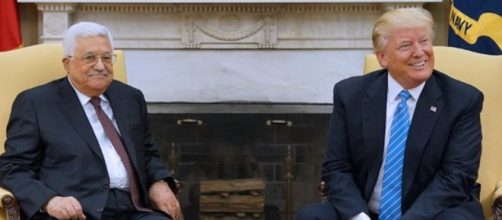American President Donald trump said today to Palestinian President Mahmoud Abas that he would be willing to work with Israelis and Palestinians to reach a peace agreement. Although he did not put forward proposals for re-launching frozen negotiations for a long time, he expressed optimism that a Middle East peace agreement is possible.
"We want to create a peace between Israel and the Palestinians," Trump said, speaking of one of the longest conflicts in the world that his predecessors failed to resolve.
There is a will on both sides
Trump said, however, that he believes there is a will to reach a peace agreement on both sides and that he does not think it will be as difficult as people think.
"This is something I honestly think is not so difficult as people have thought for years, but we need two willing parties. We believe there is a will in Israel, we believe there is a will there, and if both sides are willing, we will reach an agreement," Trump said before lunch with Abbas and senior Palestinian officials.
"We will do that," the US President later said during a joint press conference at the White House, adding that he was ready to be a mediator, moderator or arbitrator between the two sides. He pointed out, however, that no lasting peace can be achieved if Palestinian leaders "unanimously condemned invitations to violence and hatred."
A historic deal
Abbas expressed hope for a "historic deal" during Trump's mandate and added that Palestinians sought an independent state within the 1967 borders, with Jerusalem's east as the capital.
That would mean ending the 50-year occupation of the West Bank Gaza and part of the Holy City, which is mostly Palestinian.
Israel is refusing a full return to the 1967 borders, citing it as a threat to its security. "It is time for Israel to conclude its occupation, to exert freedom and dignity," said Abbas, who is in the middle of an uncertain situation in the Palestinian territories, given that Gaza has been under the control of Islamist Hamas for the past 10 years.
Noting the "suffering" but also the "hope" of his people, Abbas confirmed his attachment to the solution of the two states and called on Israel to recognize Palestinian statehood as the Palestinians recognize the State of Israel. Abbas, who controls the West Coast while militant Hamas is ruling Gaza, is under pressure from the local public that he does not agree to concessions in front of Trump.
Nabil Abu Rdainah, Abba's spokesman, said that Palestinian leadership is "attached to the political direction that leads to real peace."
Trump's administration is also working on a plan of visiting the Israeli leader in Jerusalem, and possibly Abbas on the West Bank. The meetings are planned for May 22 and 23, but for now, nobody wants to confirm them. Political circles also question the appointment of Trump's son in law Jared Kushner, who has no political experience, to supervise the Middle East-based motions.
Administration, the agencies stress, wants to engage Israeli-Sunni Arab neighbors, sharing Israeli concerns over Shiite Iran, to help revive the Middle East peace process. New American Security Center expert Ilan Goldenberg said in the meeting that "it is the very fact, that the meeting even happened, is showing that Trump's approach to the Israeli-Palestinian conflict was more conventional than the world was expecting."


